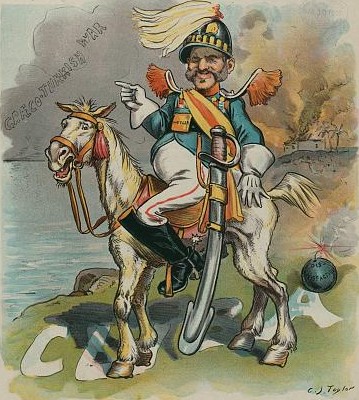


The
first of the reconcentration orders issued by Cuban Governor-General Valeriano Welyer was issued on February 16,
1896. The reconcentration policy led to deaths of many Cubans, with
estimates reaching up to about 400,000 casualties. There were several
reason for the death. When the civilian population was concentrated
together as ordered, it was found that there was often inadequate
sanitation, as well as inadequate clean water, which led to dysentery,
typhoid, cholera and similar problems. The lack of adequate food
weakened the people and made them more susceptible to illness and
disease, and in some cases led to outright starvation. In addition,
communicable diseases spread quickly in the crowded camps. The
reconcentration policy and its effect received strong coverage in the
American press and helped to sway public opinion against Spain. The
outrage led eventually to Weyler being recalled to Spain.
Below is the text of the first
reconcentration order.
The Order:
Don Valeriano
Weyler y Nicolau, Marquis of Teneriffe, Governor and Captain-General
of the Island of Cuba, General in Chief of the Army, etc., desirous of
warning the honest inhabitants of Cuba and those loyal to the Spanish
cause, and in conformity to the laws, does order and command:
ARTICLE I. All inhabitants of the district of Sancti Spiritus and the
provinces of Puerto Principe and Santiago de Cuba will have to concentrate
in places which are the headquarters of a division, a brigade, a column,
or a troop, and will have to be provided with documentary proof of
identity, within eight days of the publication of this proclamation in the
municipalities.
ART. 2, To travel in the country in the radius covered by the columns in
operation, it is absolutely indispensable to have a pass from the mayor,
military commandants, or chiefs of detachments. Any one lacking this will
be detained and sent to headquarters of divisions or brigades, and thence
to Havana, at my disposition, by the first possible means. Even if a pass
is exhibited, which is suspected to be not authentic or granted by
authority to person with known sympathy toward the rebellion, or who show
favor thereto, rigorous measures will result to those responsible.
ART. 3. All owners of commercial establishments in the country districts
will vacate them, and the chiefs of columns will take such measures as the
success of their operations dictates regarding such places which, while
useless for the country's wealth, serve the enemy as hiding places in the
woods and in the interior.
ART. 4. All passes hitherto issued hereby become null and void.
ART. 5. The military authorities will see to the immediate publication of
this proclamation.
VALERIANO WEYLER.
HAVANA, February 16, 1896.
Puck magazine, May 12, 1897 - Cartoon of Weyler (Library of Congress).
Report of the Committee on Foreign Relations, United States Senate, Relative to Affairs in Cuba. (Washington: Government Printing Office, 1898), 549.